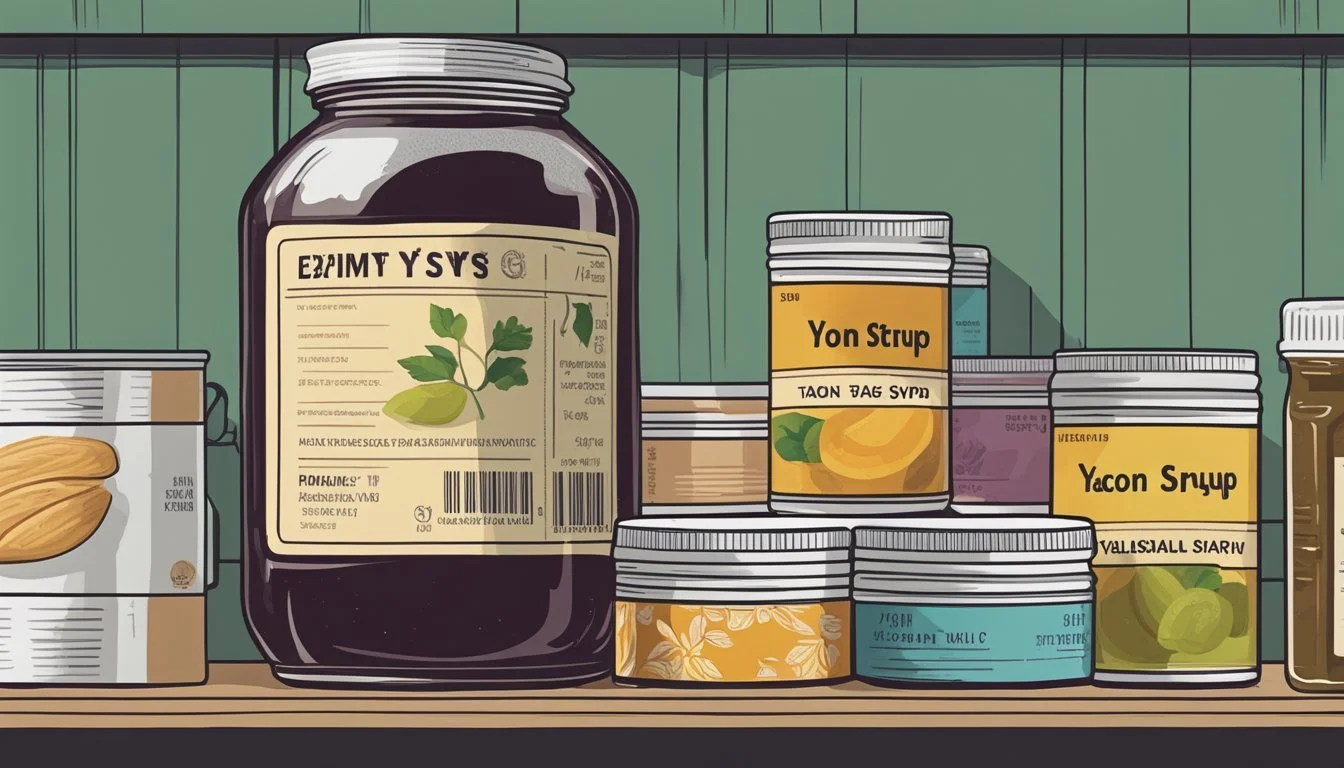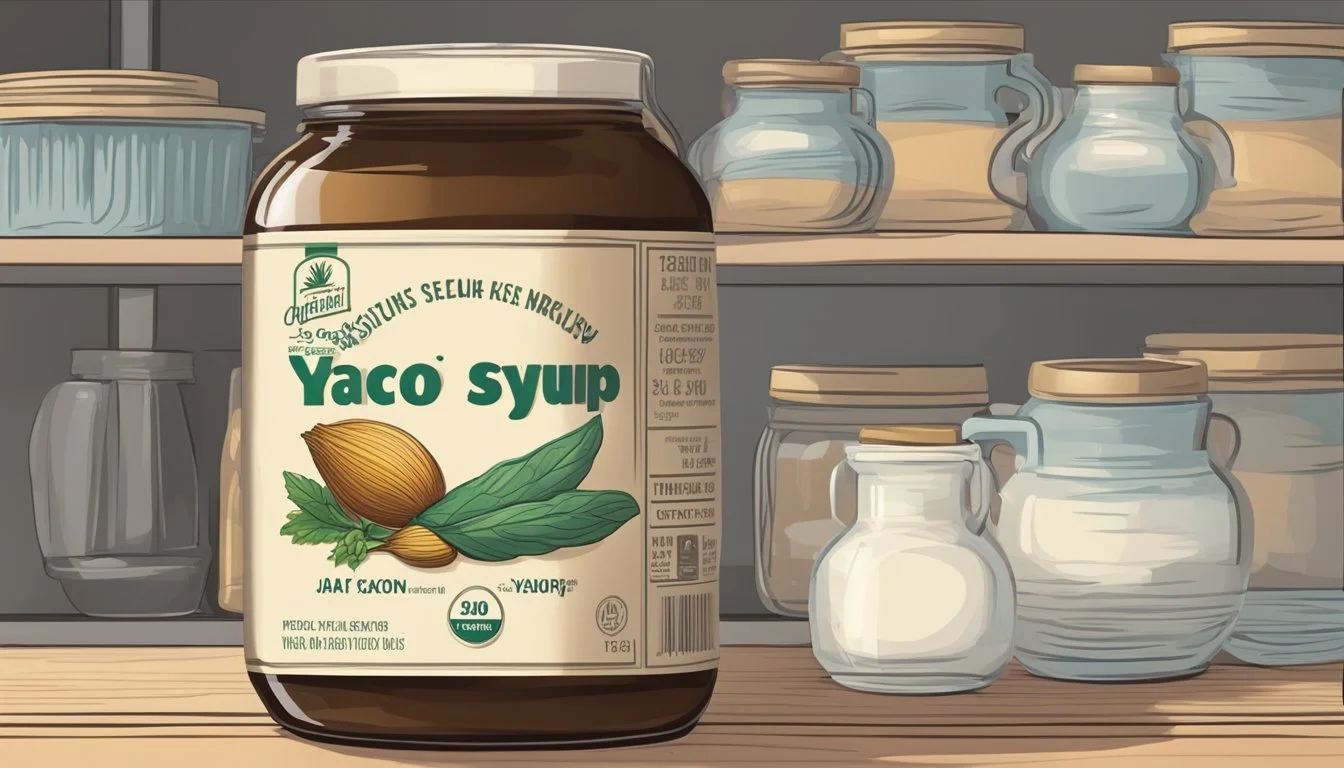How Long Does Canned Yacon Syrup Last?
Shelf Life and Storage Tips
Yacon syrup is a natural sweetener derived from the tuberous roots of the yacon plant, native to South America. It is known for its fructooligosaccharides (FOS) content, which are sugar molecules that the human body does not fully metabolize. This means that yacon syrup adds sweetness without significantly impacting blood sugar levels, making it a popular choice for those seeking a lower-calorie alternative to sugar. Its nutritional value includes the benefits of prebiotics, which support healthy gut bacteria, although it should be consumed in moderation due to its high FOS content.
Given its increasing popularity, questions about the shelf life and proper storage of yacon syrup are common, especially when it is home-canned. Properly canned yacon syrup, like other home-preserved products, typically has a shelf life of about one to two years when stored in a cool, dark place. After this period, while it may still be safe to consume, the quality of the syrup, including its flavor and nutritional profile, might degrade.
Maintaining the integrity of the seal and storing the syrup away from direct sunlight and heat helps in preserving its quality. As with all preserved goods, any jars of yacon syrup that show signs of spoilage, such as an off-smell, discoloration, or signs of fermentation, should be discarded. It's crucial for consumers to inspect their canned goods before use to ensure safety and quality.
Yacon Syrup Overview
Yacon syrup is derived from the yacon plant, Smallanthus sonchifolius, native to South America, and is acclaimed for its prebiotic properties and health benefits.
Origin and Description
Smallanthus sonchifolius, commonly referred to as the Peruvian ground apple, is the plant source of yacon syrup. This tuberous root is indigenous to the Andean valleys of South America. The sweet syrup is extracted from the yacon roots and is a traditional food product in this region, supporting a sustainable agricultural practice.
Nutritional Profile
The principal component of yacon syrup is fructooligosaccharides (FOS), which are a form of soluble dietary fiber. Here is a simplified nutritional profile:
Component Description FOS Acts as a prebiotic, aiding digestive health. Sugars Contains a minimal amount of simple sugars. Calories Lower in calories compared to conventional sugar.
Yacon syrup's prebiotic fiber is not fully broken down and absorbed by the body, thus it contributes fewer calories.
Health Benefits
Yacon syrup offers several health benefits mainly due to its high concentration of prebiotic fibers. These fibers support the growth of beneficial bacteria in the gut, which are linked to immunity and anti-inflammation. Some studies suggest that yacon syrup may also aid in weight management and reducing insulin resistance. However, these findings are based on limited research, and more comprehensive studies are required to substantiate these claims.
Shelf Life and Storage
Canned yacon syrup is known for its extended shelf life, retaining quality for an extended period if stored correctly.
Determining Expiration Date
Each can of yacon syrup comes with a best before date, which gives consumers an idea of when the syrup will be at its peak quality. While this date is an important indicator, canned yacon syrup, in most cases, remains safe to consume beyond this point, provided it has been stored appropriately and the can remains undamaged and rust-free.
Optimal Storage Conditions
The longevity of canned yacon syrup's quality is largely influenced by its storage conditions.
Temperature: It should be kept in a cool, dry place, away from direct sunlight.
Storage: To preserve the syrup's flavor and prevent spoilage, the ideal storage temperature is between 50°F to 70°F (10°C to 21°C).
By adhering to these conditions, one ensures the syrup maintains its desirable qualities for as long as possible.
Culinary Uses
Yacon syrup serves as a natural sweetener with a unique profile, offering versatility in various culinary applications. It is particularly valued in recipes where a sweetening agent is required and can be a healthier alternative due to its lower glycemic index.
Comparison with Other Sweeteners
Comparing yacon syrup with other sweeteners such as sugar, maple syrup, molasses, and honey reveals distinct differences:
Sugar: While sugar sweetens foods effectively, yacon syrup provides a similar sweetness with fewer calories and a lower impact on blood sugar levels.
Maple Syrup: Although maple syrup has a distinct flavor that yacon syrup lacks, both can be used in similar ways in the kitchen. Yacon syrup can be a suitable alternative for those looking for a different flavor profile.
Molasses: Molasses is thicker and has a robust flavor compared to the milder and fruitier notes of yacon syrup.
Honey: Yacon syrup is often compared to honey due to its consistency. However, yacon syrup can be more suitable for vegans and those with a lower tolerance for sugars.
Tips for Cooking and Baking
When incorporating yacon syrup into cooking and baking:
Maintain Consistency: For baking, if yacon syrup replaces sugar, reduce other liquid ingredients in the recipe by roughly 25% to keep the desired consistency.
Flavor Enhancement: Due to yacon syrup's subtle flavor, it won't overwhelm dishes, making it ideal for enhancing the natural taste of the ingredients.
Heat Sensitivity: One should be cautious when heating yacon syrup, as excessive heat can degrade its beneficial properties.
Yacon Syrup and Health
Yacon syrup has piqued interest for its potential benefits in digestive health, blood sugar management, and weight control. Derived from the root of the Yacon plant, this syrup is valued for its prebiotic properties and low calorie content.
Impact On Digestive Health
Yacon syrup is enriched with prebiotic fibers which facilitate the nourishment of gut bacteria, fostering a healthier digestive environment. It is particularly high in fructooligosaccharides (FOS), which resist breakdown by enzymes in the human digestive system and hence reach the colon intact where they promote the growth of beneficial bacteria. These properties contribute to improved overall gut health and can result in increased stool frequency, suggesting a positive effect on the digestive system.
Influence on Blood Sugar and Diabetes
The composition of Yacon syrup has a minimal impact on blood sugar levels, which can be particularly beneficial for individuals with diabetes. Its low glycemic index means that it does not cause a sharp rise in blood sugar, unlike many other sweeteners. This characteristic may help diminish instances of insulin resistance, and ongoing research delves into how this correlates to long-term diabetes management.
Weight Management Potential
An intriguing aspect of Yacon syrup related to weight loss is its low calorie count. With fewer calories than most conventional sweeteners, it can be a supportive aid for body weight management when used in place of higher-calorie sugar options. Studies suggest that the consumption of Yacon syrup might increase feelings of satiety, which potentially helps reduce overall food intake. This, coupled with a routine exercise program and balanced diet, might be a viable strategy for those looking to manage their body weight.
Nutritional Comparisons
In analyzing yacon syrup, understanding its nutritional specifics in comparison to other sweeteners is key for consumers seeking healthier alternatives.
Yacon Syrup versus Other Natural Sweeteners
Yacon syrup stands out as a natural sweetener with several health benefits attributed to its composition. It contains prebiotics, which foster a healthy digestive system, unlike traditional sweeteners. Yacon syrup's low glycemic index (GI) makes it a favorable option, particularly for those managing blood sugar levels.
Other natural sweeteners, like stevia and monk fruit, have gained attention for their no-calorie sweetening ability. Stevia is a plant extract that is calorie-free and much sweeter than sugar, hence only a small amount is needed. Similarly, monk fruit sweetener is extracted from the monk fruit and is notably sweeter than sugar but without the calories, impacting neither blood sugar levels nor caloric intake significantly.
Caloric and Sugary Content Evaluation
When it comes to calorie and sugar content, yacon syrup indeed presents a lower count. Here's a breakdown:
Calories: Yacon syrup generally provides about one third of the calories you would get from the same amount of sugar.
Sugars: It has a reduced sugar content due to its composition of fructooligosaccharides (FOS), which are not digested and thus do not provide calories in the same way.
Comparison to sugar:
Sweetener Calories per teaspoon Sugars (grams per teaspoon) Glycemic Index Yacon Syrup ~20 ~2 ~1 Cane Sugar ~16 ~4 ~65 Stevia 0 0 0 Monk Fruit 0 0 0
While yacon syrup could be preferred for its nutritional advantages, including a lower calorie count and distinct prebiotic benefits, individuals should consider their overall diet and health goals when choosing a sugar substitute.
Potential Side Effects
While yacon syrup is a natural sweetener with various benefits, consumers should be aware of its potential side effects, primarily linked to digestive and allergic reactions.
Digestive Tolerance Issues
Individuals consuming yacon syrup may face digestive tolerance issues due to its high fructooligosaccharides (FOS) content, which is a type of FODMAP. Although FOS can aid in digestion by acting as a prebiotic, excessive consumption can lead to discomfort, particularly in those with irritable bowel syndrome (IBS). Some reported digestive issues include:
Bloating
Gas
Diarrhea
These effects are often because the body cannot completely absorb FOS, which then ferments in the gastrointestinal tract.
Allergic Reactions and Contraindications
Though rare, individuals may develop allergic reactions to yacon syrup. Signs of an allergy may include:
Skin rashes
Difficulty breathing
Itching
People with known allergies to related plants should use yacon syrup with caution. Those with FODMAP sensitivities or existing gastrointestinal disorders are advised to consult a healthcare provider before incorporating yacon syrup into their diet.
Sourcing and Quality
When it comes to the longevity of canned yacon syrup, the quality of the product and the ethics of its sourcing are paramount. Consumers should be well-informed about the origins and manufacturing processes that contribute to the overall quality of yacon syrup.
Selecting High-Quality Yacon Syrup
Origin: High-quality yacon syrup often originates from the Andes Mountains, primarily Peru and Bolivia, where the yacon plant is indigenous. Consumers should look for products that specify the geographic source, as this can be an indicator of authenticity and adherence to traditional harvesting methods.
Processing: The method used to convert yacon plant juice into syrup is critically important. The best yacon syrup is produced by extracting juice from the plant and then boiling it until it thickens, minimizing the use of high heat to preserve the prebiotic properties.
Labeling: Pay attention to labels and certifications that indicate organic or non-GMO statuses, as these can be signs of higher quality.
Sustainable Sources and Ethics
Small-Scale Farms: Ethical sourcing often involves supporting small-scale farmers in the Andes region. This not only helps to ensure the sustainability of the yacon crop but also contributes to the local economy.
Health Food Stores: Many health food stores that value sustainability and ethical sourcing will often provide information about the origin of the yacon syrup they stock. They can be a good resource for finding high-quality and ethically sourced products.
Environmental Impact: The environmental practices of yacon syrup producers should be considered, with a preference for those using methods that have minimal negative impact on the ecosystem.
By focusing on these key aspects, consumers can ensure they purchase high-quality, sustainably sourced yacon syrup that is more likely to retain its beneficial properties and have a longer shelf life.









